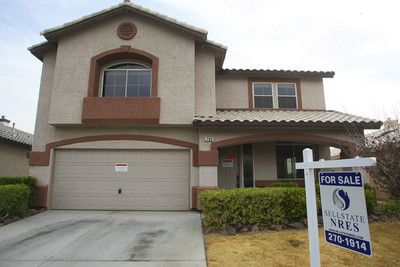Official: HOAs don’t want foreclosures

Rick Worth keeps a manicured yard at his home in the Palm Hills community near Horizon Ridge Parkway in Henderson, much nicer than the foreclosures on his block.
That’s why he’s upset at his homeowners association for initiating foreclosure on his home for unpaid fines that accumulated when he converted his lawn from grass to desert landscape.
Because he didn’t submit paperwork on time, including design approval from Southern Nevada Water Authority, Worth was slapped with a $275 fine that has grown to nearly $2,000 in four months with late penalties and collection agency fees, he said.
There are already quite a few foreclosures in the neighborhood, Worth said. One of them is three houses away from his.
“Do you want another foreclosure or do you want to work with me? There are enough problems with foreclosures and here’s a guy making his house payment and you want to take it for HOA fees? Give me a break,” Worth said.
David Stone, president of Nevada Association Services, the homeowners association collection agency for Palm Hills, said he can’t speak specifically about the account because Worth has hired an attorney. However, he said community associations can only foreclose on a home for nonpayment of monthly assessment fees, not for fines and penalties.
Worth’s claim that collection fees total more than $1,500 is “ridiculous,” Stone said. Nevada law sets a $50 limit on collection amounts of $250 to $500, he said.
“We want to work with everybody,” Stone said. “We don’t want to foreclose on anyone.”
Nevada Association Services started thousands of foreclosures last year and only six went to foreclosure, he added.
The licensed collection agent discussed the legal procedures and ramifications of HOA foreclosures, bank foreclosures and bankruptcies at an April 28 seminar attended by about 80 people, a majority of them association board members.
Homeowners who have lost their jobs, filed for bankruptcy or face foreclosure probably won’t pay their homeowners association fees, leaving associations struggling for solvency.
Las Vegas showed a 17.7 percent mortgage delinquency rate at the end of 2008, up from 14 percent in September. Preforeclosure filings, which start with a notice of default, topped 11,000 in March, according to Foreclosures.com.
Despite the statistics, most homeowners in Las Vegas are not in foreclosure and have no desire of losing the place where they’re living and raising their children, Stone said.
“So HOAs should not be scared into doing nothing with respect to collections,” he said. “In our office, we have people bringing their accounts current.”
One audience member asked about homeowners who refuse to answer letters and notices. If the home is vacant, rented or in foreclosure, it’s unclear where the the correspondence ends up, the woman said.
“Whatever. You’ve done all you can do,” Stone responded.
“You sent a letter out. It may not get received. It may not get returned. That’s all you can do. There’s no statutory requirement that you go knock on their door at 11 o’clock at night to see if they got it,” he said.
When the bank takes over the first deed of trust, often called real estate-owned, it becomes the bank’s obligation to pay HOA assessments, he said.
If the bank doesn’t pay, the account is turned over to Nevada Association Services and a notice of lien is filed.
None of Nevada Association Services’ six foreclosures last year were bank-owned. Banks won’t allow an HOA to foreclose on a $500,000 property over a $4,000 assessment, Stone said.
The Community Association Institute reports that less than 1 percent of nonjudicial foreclosures, or foreclosures that do not require court approval, result in homeowners losing their homes.
“But by threatening such a devastating loss, foreclosure actions can coerce homeowners to pay inflated delinquencies even if such delinquencies are unjustified or onerous,” an article in Legal Affairs magazine stated.
A 2001 study by Sentinel Fair Housing, a California-based homeowner advocacy group, found that the typical homeowner in a homeowners association foreclosure is $2,557 in arrears.
By contrast, the typical homeowner owes $190,000 in delinquent payments or back taxes when banks or municipal governments foreclose.
Contact reporter Hubble Smith at hsmith@reviewjournal.com or 702-383-0491.